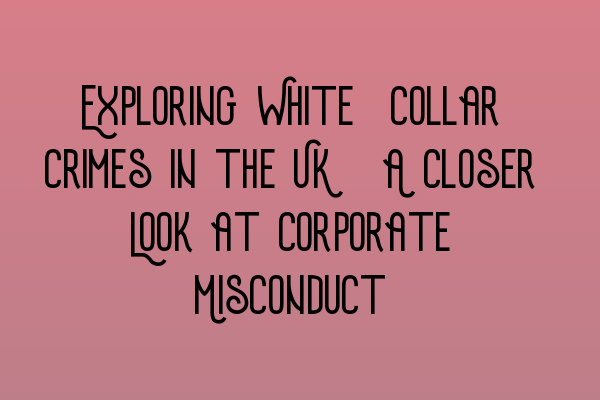Exploring White-Collar Crimes in the UK: A Closer Look at Corporate Misconduct
In recent years, white-collar crimes have made headlines worldwide. These illegal activities often involve high-ranking business executives, fraudsters, and other professionals who exploit their positions of trust within corporations for personal gain. In the UK, corporate misconduct has become a significant concern for regulators, lawmakers, and the public. This blog post aims to explore white-collar crimes in the UK, with a specific focus on corporate misconduct.
What are White-Collar Crimes?
White-collar crimes refer to non-violent offenses committed by individuals or organizations in the business or professional world. These crimes are usually financially motivated and involve deceit, dishonesty, or violation of trust. Some common examples of white-collar crimes include fraud, embezzlement, bribery, insider trading, money laundering, and tax evasion.
Corporate misconduct falls under the umbrella of white-collar crimes. It encompasses unethical or illegal activities committed by corporations, their executives, or employees that violate laws, regulations, or ethical standards.
Types of Corporate Misconduct
Corporate misconduct can take various forms. Some of the most prevalent types of corporate misconduct in the UK include:
- Financial Statement Fraud: This involves manipulating company financial records to deceive investors, shareholders, or regulators.
- Bribery and Corruption: Offering, giving, receiving, or soliciting improper payments or benefits to obtain or retain business advantages.
- Insider Trading: Illegally trading stocks or securities based on material non-public information.
- Money Laundering: Concealing the origins of illegally obtained money by making it appear as if it came from legitimate sources.
The Impact of Corporate Misconduct
Corporate misconduct affects various stakeholders and can have significant consequences:
- Financial Losses: Investors, shareholders, and consumers may suffer financial losses due to corporate misconduct, such as fraudulent investment schemes or misleading advertising practices.
- Reputation Damage: Corporations involved in misconduct can face reputational damage, leading to loss of trust among customers, partners, and the general public.
- Job Losses: When corporations engage in illegal activities, employees may lose their jobs as a result of business closures, downsizing, or restructuring.
- Legal Consequences: Corporations found guilty of corporate misconduct can face legal penalties, fines, and even criminal charges, which can further damage their operations and bottom line.
Regulatory Response and Enforcement
The UK has a robust regulatory framework in place to address corporate misconduct. Regulators such as the Financial Conduct Authority (FCA), Serious Fraud Office (SFO), and Her Majesty’s Revenue and Customs (HMRC) play a crucial role in investigating and prosecuting white-collar crimes.
The enforcement of legislation, such as the Companies Act 2006 and the Bribery Act 2010, aims to curb corporate misconduct and ensure corporate responsibility and accountability.
Preventing and Investigating Corporate Misconduct
Preventing corporate misconduct requires a multi-faceted approach. Corporations should implement robust internal controls, compliance programs, and ethical guidelines. Regular training and awareness programs can educate employees about the risks of misconduct and the importance of ethical behavior.
When corporate misconduct is suspected or detected, prompt and thorough investigations are essential. Internal investigations can help identify wrongdoing, gather evidence, and take appropriate corrective actions. External law enforcement agencies and regulatory bodies may also get involved in investigating and prosecuting corporate misconduct cases.
Conclusion
Corporate misconduct poses significant challenges to businesses, economies, and society. The UK’s efforts to combat white-collar crimes and regulate corporate behavior are crucial for maintaining trust, transparency, and integrity in the business environment.
At SQE Criminal Law & Practice Law UK, we aim to provide comprehensive legal services, including representing businesses and individuals involved in white-collar crime cases. Our experienced team of solicitors specializes in defending clients facing allegations of corporate misconduct.
For further information on preparing for the SQE exams or to explore our range of legal courses, please visit our SQE 1 Practice Exam Questions and SQE 1 Practice Mocks FLK1 FLK2. We also offer SQE 2 Preparation Courses and SQE 1 Preparation Courses to help aspiring solicitors succeed in their legal careers.
Stay up-to-date with the latest SRA SQE Exam Dates and legal news by following our blog and social media channels.
